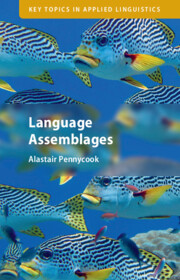Crossref Citations
This Book has been
cited by the following publications. This list is generated based on data provided by Crossref.
Pennycook, Alastair
2023.
Toward the total semiotic fact.
Chinese Semiotic Studies,
Vol. 19,
Issue. 4,
p.
595.
Pennycook, Alastair
2024.
Language, deconstructivism, and the Guggenheim Bilbao Museoa.
Critical Inquiry in Language Studies,
p.
1.
Lamb, Gavin
2024.
Multispecies language landscapes.
Linguistic Landscape. An international journal,
Vol. 10,
Issue. 4,
p.
370.
Kerfoot, Caroline
and
Kuteeva, Maria
2024.
Dynamics of Multilingualism.
p.
1.
Martins, Eduardo Espindola Braud
and
Viana, Rodrigo Ferreira
2024.
Necropolítica do ciborgue.
Domínios de Lingu@gem,
Vol. 18,
Issue. ,
p.
e1868.
Shahri, Naseh
and
Karizmeh, Mojtaba Soleimani
2024.
Inventing a Language Online: The Practice of Edutainment in English Teaching Instagram Posts.
International Journal of Applied Linguistics,
Siffrinn, Nicole
and
Coda, James
2024.
A literature review of posthumanist and new materialist research in applied linguistics.
Critical Inquiry in Language Studies,
p.
1.
Erdocia, Iker
Migge, Bettina
and
Schneider, Britta
2024.
Language is not a data set—Why overcoming ideologies of dataism is more important than ever in the age of AI.
Journal of Sociolinguistics,
Vol. 28,
Issue. 5,
p.
20.
Pennycook, Alastair
2024.
After Words: There Is No Language without Materiality.
Signs and Society,
Vol. 12,
Issue. 1,
p.
109.
Morton, Tom
2025.
Beyond inter- and transdisciplinarity.
Journal of English-Medium Instruction,
Vol. 4,
Issue. 1,
p.
123.
Chan, Brian Hok-Shing
2025.
Borrowing or code-switching? Single-word English prepositions in Hong Kong Cantonese.
Open Linguistics,
Vol. 11,
Issue. 1,
García, Ofelia
2025.
Understandings entrenzados: A commentary.
Journal of Research in Science Teaching,
Vol. 62,
Issue. 1,
p.
379.
Wong, Nick
and
García, Ofelia
2025.
Expandability and temporality in translanguaging spaces: a space-centred systematic observation of Kongish Daily
.
Applied Linguistics Review,



